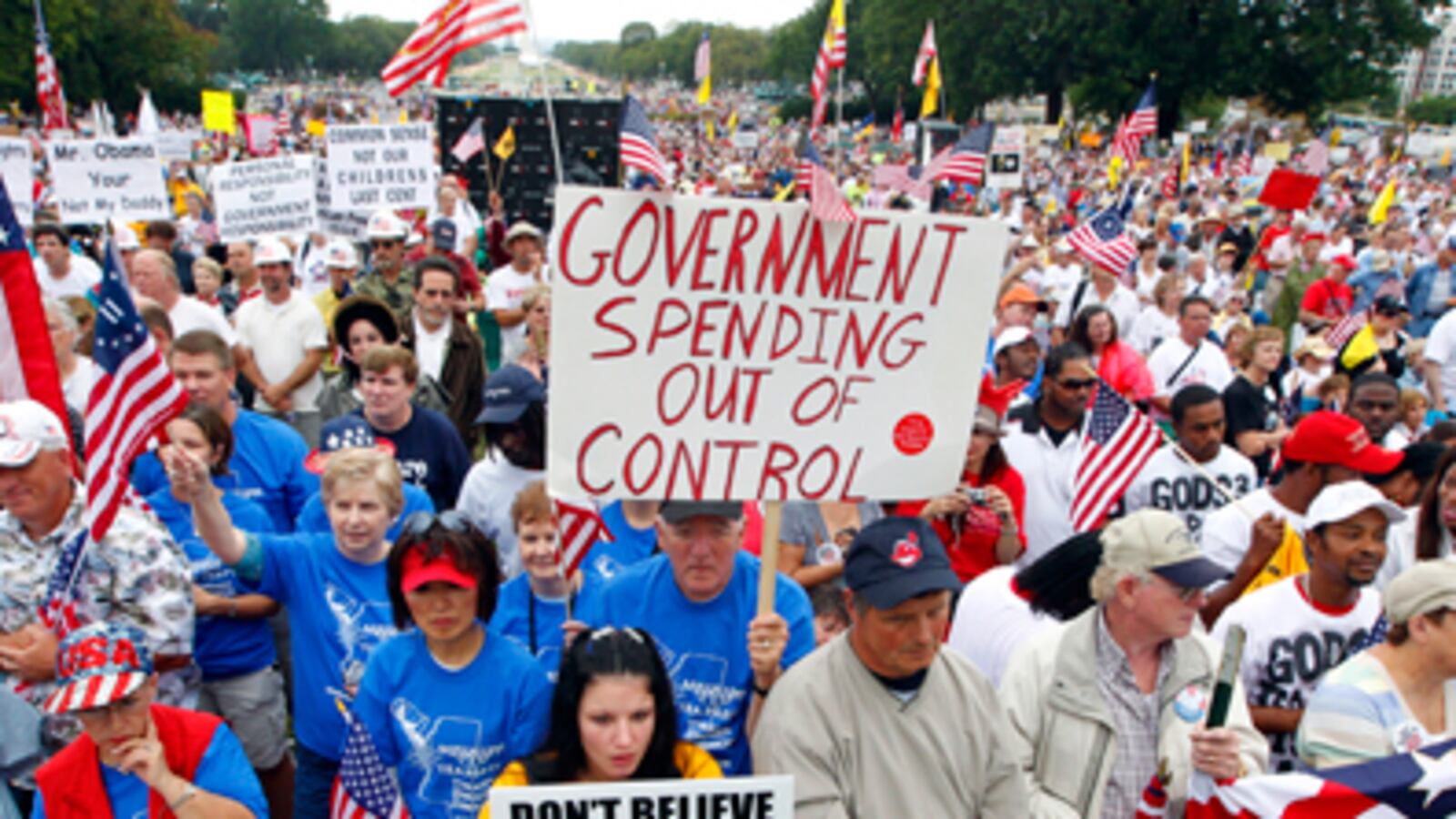Is the Tea Party movement, which may swing the midterm elections this November, a powerful force strengthening into a third party, or is it a paranoid fringe whipped up by commentators like Fox News’ Glenn Beck? Will Bunch, author of The Backlash: Right-Wing Radicals, High-Def Hucksters, and Paranoid Politics in the Age of Obama, and Douglas E. Schoen, co-author with Scott Rasmussen of Mad as Hell: How the Tea Party Movement Is Fundamentally Remaking Our Two-Party System, debate the movement’s influence this week for The Daily Beast. To read Will Bunch’s response to Douglas Schoen’s post, please see here.

Will Bunch’s opening statement:
I spent a good chunk of the last year on an unlikely odyssey, especially for a longtime journalist with a progressive bent. I traveled America looking for the heart of the so-called Tea Party movement by doing something that few others seemed to be doing: venturing out and listening to what they really had to say. No experience boiled down the essence of the right-wing backlash against Barack Obama more than the hour I spent in a ’50s-relic diner on the outskirts of Dover, Delaware, with three activists from that state’s most visible Tea Party-style group, the Delaware 9-12 Patriots.
Over heaping blue-plate specials of spaghetti and meatballs, the leader, a weathered 65-year-old Vietnam vet named Russ Murphy, and his husband-and-wife lieutenants Alex and Theresa Garcia, made it clear that while they were fresh to political activism, the roots of their passion were nothing new. Instead they tapped deeply into the powerful strain of middle-class cultural conservatism that has been a force in America since the 1960s, the psychic place that historian Rick Perlstein has labeled “Nixonland.” Murphy, in particular, is a straight line of resentments, from his alleged mistreatment by “hippies” coming home from ’Nam in the late ’60s to Obama’s Fox News-hyped link to former Weather Underground leader William Ayers. Alex Garcia’s politics, meanwhile, come from the National Rifle Association, of which he is a highly enthusiastic member.
Two things, essentially, drove Murphy and the Garcias off the couch and onto the barricades. First and foremost was their deep unease with Obama. “The first time I heard Obama speak, I felt very, very uncomfortable,” Theresa Garcia told me, adding that she felt the then-candidate’s use of words like “change” was “scary.” These inner doubts about the man who became the first African-American president inspired a quest to find ways to question the legitimacy of both the 44th president’s election and Obama himself. The trio led me through a long and mostly fact-free explanation of how Obama only won in 2008 because of the Electoral College, and they even tried to deny his 100,000-vote landslide win in Delaware, finally telling me it was only because of “the handout people” in Wilmington, with its large minority population. Murphy went further, telling me that Obama is “not American” and insisting he hasn’t presented “the documentation” to prove he’s eligible to be commander in chief. The second factor that empowered their movement was the blend of news and misinformation they receive from the popular Fox News Channel and especially from Glenn Beck, whose televised call for the creation of a 9-12 movement is what inspired Murphy to launch his band of “patriots.”
• John Avlon: The Tea Party’s Northern Insurgency• Benjamin Sarlin: The Tea Party’s Coporate Ally • Ben Crair: The Democrats Can Win the HouseI heard variations on their refrains from the dozens of right-wing activists I interviewed, from the anti-immigration frenzy of the Arizona desert to a leafy Massachusetts outpost of the paranoid Oath Keepers, a fast-growing group concerned that the government may force citizens into concentration camps. In my new book, The Backlash: Right-Wing Radicals, High-Def Hucksters, and Paranoid Politics in the Age of Obama, I lay out three elements that have fueled the rise of the anti-Obama backlash. One is sweeping cultural anxiety in predominantly white, middle-class sectors of the nation about social change—the gradual march of America moving toward a non-white majority by the mid-21st century, which was so abruptly punctuated for many by the sudden arrival of a non-white president in 2008. That year’s economic crisis and its job-impaired aftermath have poured gasoline on that brushfire, not only heightening anxieties but also, through layoffs and premature retirements, creating a plenty-of-spare-time-available pool of Tea Party recruits. The third factor is the crucial role of those I call the “high-def hucksters,” people like Glenn Beck and Sarah Palin, as well as a cynical new breed of Republican pols and lesser-known entrepreneurs who are making millions of dollars or winning elections off the backs of the rank-and-file. They shamelessly steer fear and anger against “ the Other”—whether it’s a Mexican immigrant or an American imam… or Barack Hussein Obama—instead of working to solve America’s real and complicated problems.
Others would tell you a different story. This week here at The Daily Beast, I will be debating Douglas Schoen, co-author with fellow national polling guru Scott Rasmussen of another new book, Mad as Hell: How the Tea Party Movement Is Fundamentally Remaking Our Two-Party System Their book agrees with mine on one key point: that the decimation of the U.S. middle class, a tragedy that has been decades in the making, marks a powerful tipping point for the anger in America today. But their broader conclusion, that the Tea Party movement is a powerful organic and independent force akin to a third party, flies in the face of evidence that the Obama backlash is largely a new “paranoid style” for a conservative and overwhelming Republican movement that has existed for decades. More important, in their eagerness to ignore the underlying currents of race and what Beck once called “white culture,” they ignore the roots of the conflagrations we now see on the Arizona border and at a proposed mosque site in Lower Manhattan. And they give shockingly short shrift to the critical role of the media and specifically a huckster such as Beck, whose tire treads are all over the Obama backlash, in whipping up fear for fun and profit, with no regard to the consequences.
The movement has the potential to elect senators, governors, members of Congress, and even the next president of the United States. Time will tell, says Schoen.
Like Schoen and Rasmussen, I believe it is critically important in this election season to understand the Tea Party movement—both its origins and its potential impact. But its power is not its size, as some would argue. Representing no more than one-quarter of America, predominantly the traditional far right of the Republican Party, the Tea Partiers have become the paranoid tail wagging the big dog of American politics, by inspiring 41 senators representing just 37 percent of the population to block meaningful reform on issues ranging from climate change to immigration. That power was blunted in 2008, when the true most potentially potent political force—a broad and diverse coalition that included young voters and blacks, Hispanics, Asians, gays, and the better educated and less religious of all groups—woke up to elect Obama before retreating to become our new “silent majority.” Ironically, it is this true majority that can decide again in November 2010 whether the Tea Party will continue to be a force in American politics in the years to come.
Douglas Schoen’s opening statement:
The Tea Parties and angry town-hall meetings of last summer seemed to take everyone by surprise.
They shouldn’t have. Populist movements have always arisen in times of economic hardship and uncertainty.
Today our country is in the midst of a massive, unprecedented, underreported, and underappreciated new populist revolt that has two wings: a left wing that wants universal health care and redistributive economic policies, and a right wing that wants to reduce the power of government to interfere in our lives, which has manifested itself as the Tea Party movement.
Indeed, the movement, which stands for fiscal discipline, limited government, and balancing the budget, has become one of the most powerful and extraordinary phenomena in recent American political history.
It is as popular as both the Democratic and Republican parties, and has an agenda that speaks to the broad concerns of the American electorate.
Between 20 percent and 25 percent of the American people call themselves supporters of the movement, and between 5 percent and 10 percent of Americans say they have actively supported the Tea Party movement: gone to a rally, contributed money, or taken specific steps to support it.
Put another way, the dissatisfaction in the American electorate with the established political order, particularly the Congress and the president both having majority negative ratings, has led the Tea Party movement to become as potent a force as any political party in the United States.
The movement is a broad-based national movement whose scope, breadth, and depth of support have been unappreciated and fundamentally misunderstood.
It emerged as a spontaneous, grassroots uprising when thousands of tax-protest rallies sprang up across the country on April 15, 2009, demonstrating a level of activism and enthusiasm both unprecedented and arguably unique in recent American political history.
The movement grew stronger with the protest over health care that summer. Despite the wide variety of groups and organizations that arose on a national level—calling themselves, in varying forms, Tea Party leadership, the movement is a genuine phenomenon representing an outpouring of anger at big government and big spending.
And in the span of a year the Tea Party movement has only gotten stronger, more vigorous, more vibrant, and potentially more powerful and influential.
To be sure, a great effort has been made to demonize the movement. Indeed, it has been one of the most derided and minimized and, frankly, most disrespected movements in American history.
Yet despite being systematically ignored, belittled, marginalized, and ostracized by political, academic, and media elites, the movement has grown stronger and stronger.
So-called professionals in politics, business, and media have completely failed to comprehend the new populism and have dismissed it as marginal and extreme. But it is reshaping American politics—whether politicians and elite journalists like it or not.
The various activists, members, and supporters of the movement are united behind a simple set of principles, advocating limited government, limitations to the recently passed health-care reform bill, deficit reduction, and a return to constitutional principles.
Their focus is economic policy first and foremost. Interviews with members show little if any concern about race, and the varying reports about racism in the movement have been shown to be without foundation.
Despite attempts by liberal political and media elites to portray the movement as being driven by racism, bigotry, and white supremacy, it is the Tea Party agenda of fiscal responsibility, limited government, and deficit reduction that unites its supporters.
The impact of the Tea Party movement has been twofold.
First, it has helped move the Republican Party to the right. The Tea Party’s energy is such that it has the power to dictate the ideology that is driving the Republican Party and to influence if not control Republican nominations and primary outcomes. In the absence of clear leadership within the Republican Party, the Tea Party movement, both in terms of ideology and impulse, is driving the direction and the agenda of the Republican Party.
For the party, the movement has been more a blessing than a curse, but it has been deeply problematic as well. It has energized conservatives and created a positive counterforce on the right for the Republicans. But the strength of the movement demonstrates the absence of any real ideas or philosophy in the Republican Party.
Second, it has the capacity to motivate a more broad-based segment of the electorate. By acting as the catalyst motivating voters to express their anger with President Obama’s policies as well as those of the Democratic Congress, the movement has the potential to elect senators, governors, members of Congress, and even the next president of the United States. Time will tell.
In terms of specific impact, the Tea Party movement has the capacity to elect up to six new members of the Senate, from Florida, Utah, Nevada, Kentucky, Alaska, and Colorado, and swing the House to Republican control this November.
The movement is not a flash in the pan, as many have assumed. Nor is it a movement of racist rednecks and ignorant boobs, as its detractors have crudely suggested. To the contrary, it is an authentic grassroots movement of concerned American citizens demanding to be heard by an out-of-touch political establishment. Their concerns are real and their issues are legitimate, the authors maintain; moreover, the new populism is here to stay, and it has already changed our politics for the better.
Will Bunch, author of The Backlash: Right-Wing Radicals, High-Def Hucksters, and Paranoid Politics in the Age of Obama, is a senior writer at the Philadelphia Daily News and a senior fellow at Media Matters for America. He is also the author of the recent Tear Down This Myth: The Right-Wing Distortion of the Reagan Legacy. His Daily News blog, Attytood, is one of the most successful political sites on the Web. A career journalist, Bunch shared a 1992 Pulitzer Prize for spot news reporting when he worked at New York Newsday. He lives in the Philadelphia suburbs.
Douglas Schoen is a political strategist and author of the upcoming book Mad as Hell: How the Tea Party Movement is Fundamentally Remaking Our Two-Party System to be published by Harper, an imprint of HarperCollins on September 14. Schoen has worked on numerous campaigns, including those of Bill Clinton, Hillary Clinton, Michael Bloomberg, Evan Bayh, Tony Blair, and Ed Koch.







